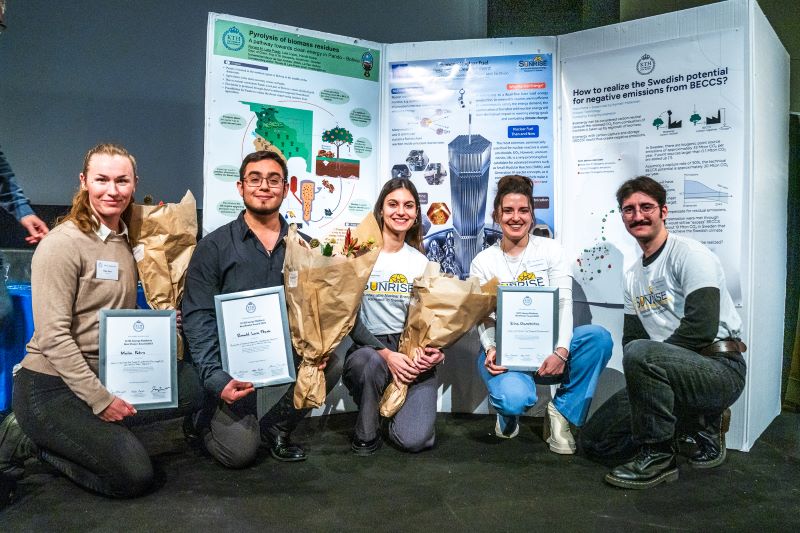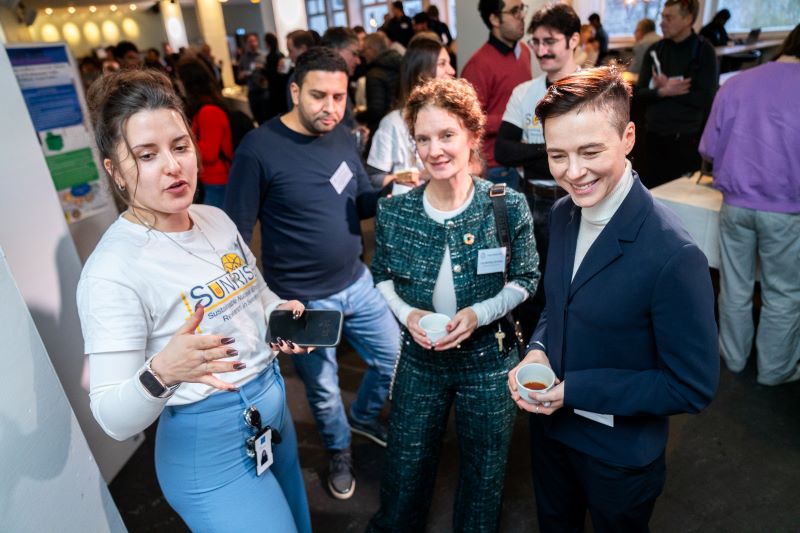KTH Energy Dialogue 2023
Energy security and resilience topped the agenda of this year’s KTH Energy Dialogue. KTH Energy Dialogue 2023, organised by KTH Energy Platform, once again gathered researchers, students and representatives of business and society at Nymble. This year’s theme was energy security and resilience, and the event attracted more than 200 participants to an afternoon filled with exciting panel discussions.

KTH Energy Dialogue 2023 was officially opened by Vice-Chancellor Anders Söderholm, who spoke about the importance of meeting places for researchers and decision-makers in the energy sector. He believed that the theme for this year’s event was highly relevant given current global uncertainty. For universities, this involves finding a balance between security measures, openness and transparency, Söderholm said. He also highlighted the recently opened Cybercampus Sweden as proof that KTH is on the right track.
“KTH’s new vision is to lead the development of a sustainable society and that is exactly why we’re all here today,” Söderholm said.
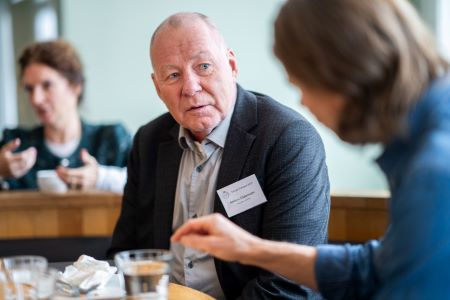
All participants were then welcomed by Lina Bertling Tjernberg, Director KTH Energy Platform, and Christophe Duwig, Deputy Director, who in turn introduced the day’s moderator, Willy Silberstein.
The first panel discussion of the day was entitled: Energy Security and Resilience from Business, Politics and Academia. Maja Lundbäck, political expert to the government’s Minister for Energy and Business, spoke about ongoing efforts to shape new political proposals regarding the country’s energy supply and emphasised how everyone is invited to contribute knowledge.
“Sweden is already well ahead in terms of electrification, so we now need to strengthen our electricity infrastructure and increase electricity production. To do this, we need to invest more to strengthen the electricity system,” Lundbäck said.
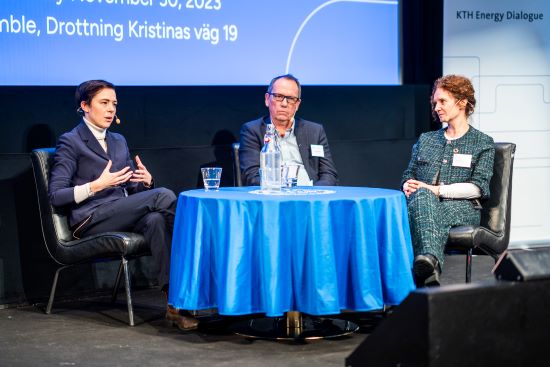
Lundbäck also referenced the government’s initiative to establish broad political collaboration on energy, which should pave the way to a more long-term approach.
The panel’s next speaker was Bo Wahlberg, professor and Director WASP at KTH. He pointed out the long-term work within WASP aimed at developing solutions in artificial intelligence and autonomous systems. He stressed the need for more knowledge and more training places to fill the skills shortages of tomorrow.
Bertling Tjernberg, professor and Director KTH Energy Platform, was also on the first panel. She affirmed the importance of today’s collaboration between KTH’s research platforms, and the need for clear political goals to facilitate research collaboration.
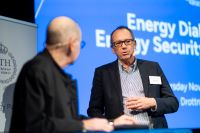
“We expect clear goals - both short and long-term - as well as a place at the table where decisions are made because we want to contribute our knowledge to the development of a sustainable energy system,” she said.
Wahlberg underlined the necessity of investment in the energy field similar to that made in other sectors such as life science.
The panel also received a question from the audience about why politicians do not talk more about the need to save energy. Lundbäck pointed to the EU’s goal of reducing energy use by roughly eleven per cent, which will have an impact in Sweden as well.
Lundbäck also welcomed a proposal that researchers should be more proactive in contributing to political planning.
“One of the main reasons I participate in the KTH Energy Dialogue is to open up more dialogues with the research world and to establish long-term collaborations with academia and business,” Lundbäck said.
The second panel discussion of the day was entitled Conflict of Objectives for Energy Transition – Security, Sustainable and Open Source and was opened by Pontus Johnson, professor at KTH and Director of the Centre for Cyber Defence and Information Security.
Johnson gave a brief overview of the urgent need to strengthen the cyber security of digital systems and the considerable need for skills that this requires. He pointed to the complexity of today’s systems as a key driver of this and underscored the importance of further research in the field. He also went into the background of the newly established Cybercampus Sweden initiative, which will be officially opened at KTH in early 2024.
“Sweden has woken up late to cyber security issues because we experienced a high pace of digitalisation without really stopping to think. Today, however, the situation has changed and initiatives such as Cybercampus Sweden mean that we have a chance to catch up again,” Johnson said.
Then Olga Kordas, Programme Director Viable Cities, took the floor and explored the role of cities in addressing today’s climate challenges. Although the world’s cities only make up about three to four per cent of global land surface area, they account for about 70 per cent of the world’s emissions.
“We must win the climate battle in cities - not by simply reducing carbon dioxide emissions, but also by broadening our social responsibility,” she said.

Influencing energy use, transport systems and access to green spaces is possible by taking relatively simple measures, she said; the problem is that the need is so great. One city that has succeeded, however, is Leuven, in Belgium, which is among the cities in the world that have gone the furthest in reducing their climate footprint.
There then followed a presentation by William Usher, lecturer at KTH, who also participated in the autumn workshop organised by KTH Energy Platform and Digitalisation Platform. Usher talked about work being done to develop and compare different climate models to provide better decision-making information to politicians. He also underlined the need to contribute to open research to also involve the public more broadly.
After a short break with the chance to meet and establish contacts between researchers and industry, it was time for the third panel: Technologies for Future Energy - Quantum Materials, Solar Cells and Nuclear Power. During the panel, researchers contributed cutting-edge knowledge about upcoming technological solutions that are set to make a big difference to our energy supply in the long term.
Egor Babaev, Professor of Theoretical Physics, began with an insight into the research that led to the discovery of a new class of superconductors, i.e., electrical conductors that have no resistance.
Professor Liubov Belova then spoke about research that led to a new manufacturing method for solar cells made from perovskite using ink jet technology. The method is scalable, fast and energy-efficient and may enable considerably more surfaces to be covered with tailor-made solar panels than is currently the case.
Professor Ute Kappel recently moved from KTH to Uppsala University and a role at the Wallenberg Initiative Materials Science for Sustainability (WISE). She conducts basic research in materials technology to increase knowledge of new solar cell materials. She touched on some of the challenges facing solar cell technology, among them the need for energy storage and the development of new non-toxic materials that are more recyclable.
The last speaker on the research panel was Janne Wallenius, Professor of Reactor Physics, who gave an insight into the company Blykalla, which was based on research conducted at KTH. The company is developing a lead-cooled SMR reactor and plans to build a first prototype in Oskarhamn within the next few years. Wallenius received the KTH Innovation Award 2022 for his work and the goal is to have a finished product in place no later than 2030.
The last panel of the day - Energy from Heat and Solar and the Sustainable Society - was opened by Jonas Anund Vogel, Director KTH Live-In Lab, who presented the new venture DIG-IT Lab. This initiaive aims to create a new overall data platform for the management and control of smart buildings of the future. The platform will connect different sensors and systems in a common infrastructure capable of including several buildings and where data is shared between several different actors. The DIG-IT Lab venture will run for five years and has received funding of approximately SEK 124 million.
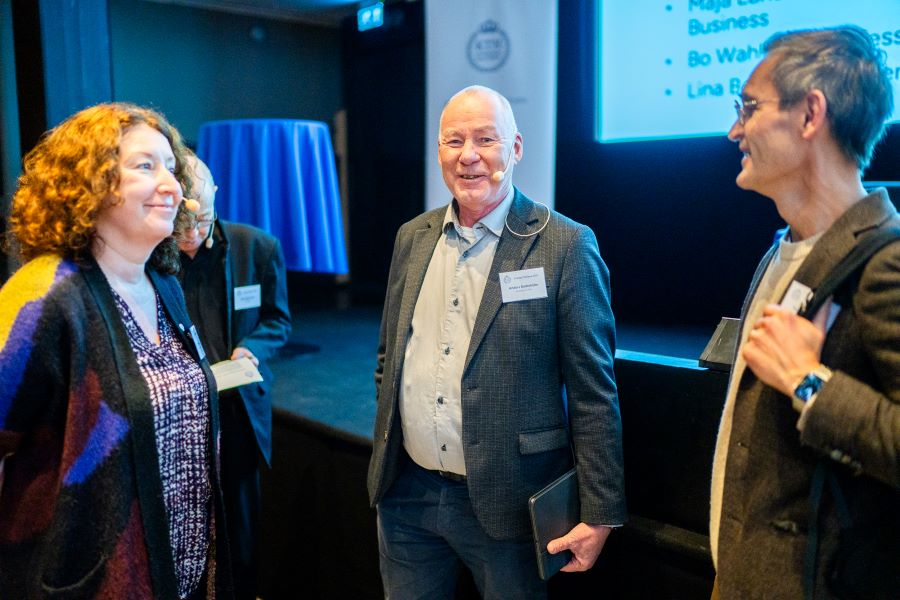
He was followed by Fabian Levihn, researcher at KTH and Head of R&D at Stockholm Exergi. He pointed to the role that district heating can play in the energy mix and the development of a more sustainable society. He also highlighted the challenges of motivating investors to finance new energy technologies at a time when new technologies are developing as quickly as requirements are changing. Levihn also talked about a smaller-scale project in which AI and machine learning are used to control room temperatures depending on how many people are in a room at any given time.
Rafael Eduardo Guedez Mata, researcher and Head of Division for the Division of Heat and Power Technology, spoke about a number of large-scale solar cell projects involving KTH researchers. In several of the projects, solar cells are combined with other technologies to store energy in the form of heat, including in various natural materials such as stone, air and liquids. He emphasised the need for various complementary solutions to address tomorrow’s energy needs, and that this should take place in close collaboration with industry.
Text: Magnus Trogen Pahlén


